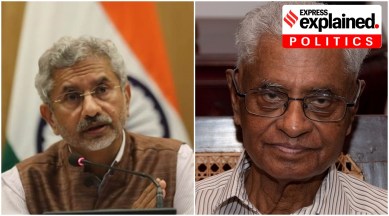S Jaishankar says Indira Gandhi removed his father as Union Secretary: Who was K Subrahmanyam?
K Subrahmanyam was described as the doyen of Indian strategic affairs thought by former Vice-President Hamid Ansari and was one of the main architects of India's national security policy. He chaired the Kargil War Review Committee and the committee that drafted India's nuclear deterrence doctrine.

External Affairs Minister S Jaishankar Tuesday (February 21) said that his father K Subrahmanyam was removed as Union Secretary under Prime Minister Indira Gandhi, and he was superseded during the tenure of Rajiv Gandhi.
The External Affairs Minister’s father, K Subrahmanyam, was an IAS officer and one of India’s most reputed strategic thinkers, a towering authority on geopolitics who enjoyed the confidence of several Prime Ministers.
monthly limit of free stories.
with an Express account.
What S Jaishankar said about Indira Gandhi
In an interview with ANI, Jaishankar said, “I wanted to be the best foreign service officer. And to my mind, the definition of the best that you could do was to end up as a Foreign Secretary. In our household, there was also, I won’t call it pressure, but we were all conscious of the fact that my father, who was a bureaucrat, had become a Secretary but he was removed from his secretaryship. He became, at that time, probably the youngest Secretary in the Janata government in 1979,” Jaishankar said, as reported by ANI.
“In 1980, he was Secretary, Defence Production. In 1980 when Indira Gandhi was re-elected, he was the first Secretary that she removed. And he was the most knowledgeable person everybody would say on defence,” Jaishankar said.
The External Affairs Minister said his father was a very upright person, and “maybe that caused the problem, I don’t know.”
“But the fact was that as a person he saw his own career in bureaucracy, actually kind of stalled. And after that, he never became a Secretary again. He was superseded during the Rajiv Gandhi period for somebody junior to him who became a Cabinet Secretary. It was something he felt…we rarely spoke about it. So he was very, very proud when my elder brother became Secretary,” said Jaishankar.
Jaishankar’s brother, IAS officer S Vijay Kumar, is a former Rural Development Secretary of India. He has another brother, the historian Sanjay Subrahmanyam.
K Subrahmanyam’s roles and posts
In his long career as a civil servant and strategic affairs expert, Subrahmanyam was known for, among other things, chairing the Kargil War Review Committee and for his championing of India’s nuclear deterrence policy.
When he passed away in 2011, then Prime Minister Manmohan Singh said Subrahmanyam had made important and lasting contributions to the evolution of India’s defence, security and foreign policies. “His work outside the Government is perhaps even more impressive and he spearheaded and developed the field of defence studies in the country,” the then PM had said.
Then Vice President, Hamid Ansari, described him as “the doyen of the strategic affairs community in India”, and said he remained “one of the key architects of our security policy doctrine. He was instrumental in sensitising policy makers and citizenry to strategic issues and helping formulation of policy options to tackle them.”
Born in January 1929 in Tamil Nadu’s Tiruchirapalli, Subrahmanyam went to Madras Presidency College and subsequently entered the Indian Administrative Service.
Subhrahmanyam was the founding Director of the security think tank Institute for Defence Studies and Analyses (IDSA), now the Manohar Parrikar Institute for Defence Studies and Analyses. In 1999, Subrahmanyam declined the honour of a Padma Bhushan, saying that bureaucrats and journalists should not accept government awards.
India’s nuclear doctrine
In 1998, under PM Atal Bihari Vajpayee, Subrahmanyam was appointed the Convenor of the first National Security Council Advisory Board (NSCAB), which drafted the country’s Draft nuclear doctrine. In face of both internal and international opposition, Subrahmanyam’s position remained that while India needed nuclear weapons, it would not resort to first use.
As he wrote in an article for The Indian Express in 2009, “No country campaigned as vigorously for nuclear disarmament as India, which was finally compelled to declare itself a nuclear weapons state because of the extremely delicate security situation in which it found itself…There is a near-universally shared perception that deterrence has worked and the Indian official nuclear doctrine is based on this premise.”
Role in Kargil War Review Committee
In 1999, Subrahmanyam was appointed Chairman of the Kargil Review Committee, set up by the government in the aftermath of the war with Pakistan. The Committee recommended changes in the structure of the Indian intelligence services and the creation of a Chief of Defence Staff (CDS). This was finally adopted in December 2019 by the Narendra Modi government, with former Army chief late General Bipin Rawat becoming the first CDS.
Subrahmanyam had also strongly criticised the Vajpayee’s government decision of merging the posts of Principal Secretary to the Prime Minister and the National Security Adviser (NSA). In 2004, Manmohan Singh’s government bifurcated the two posts.